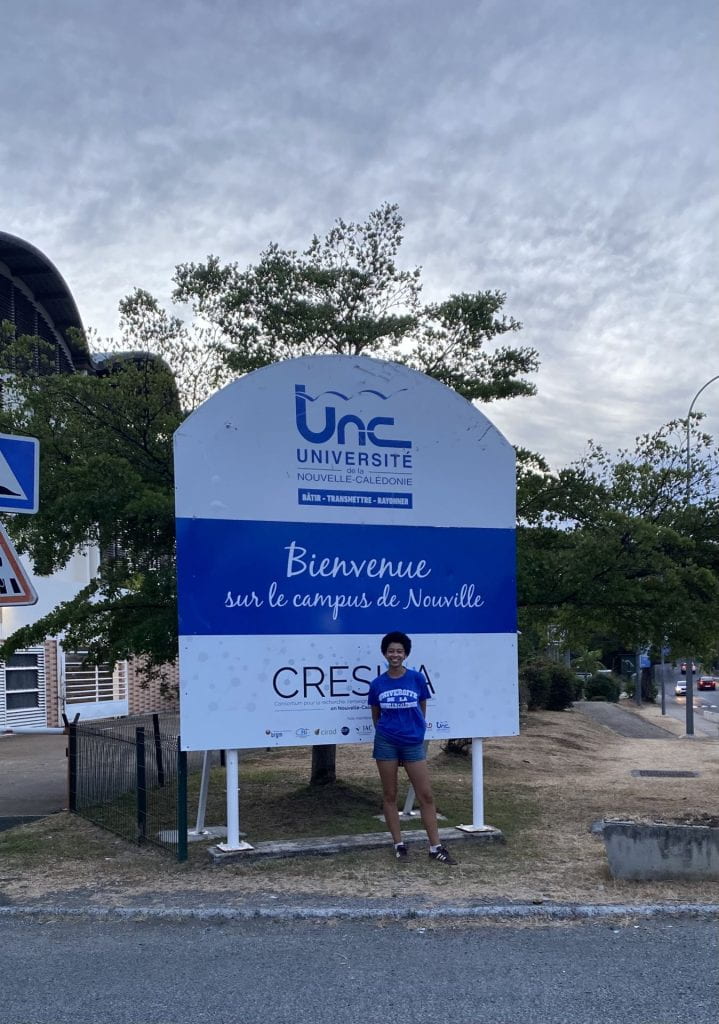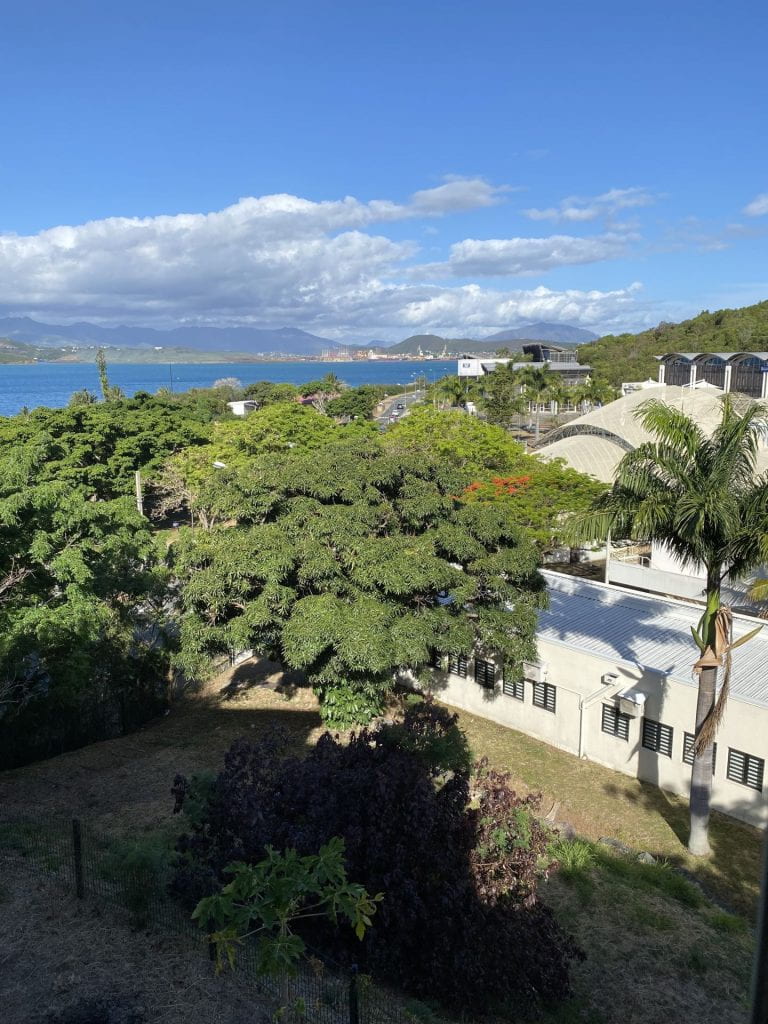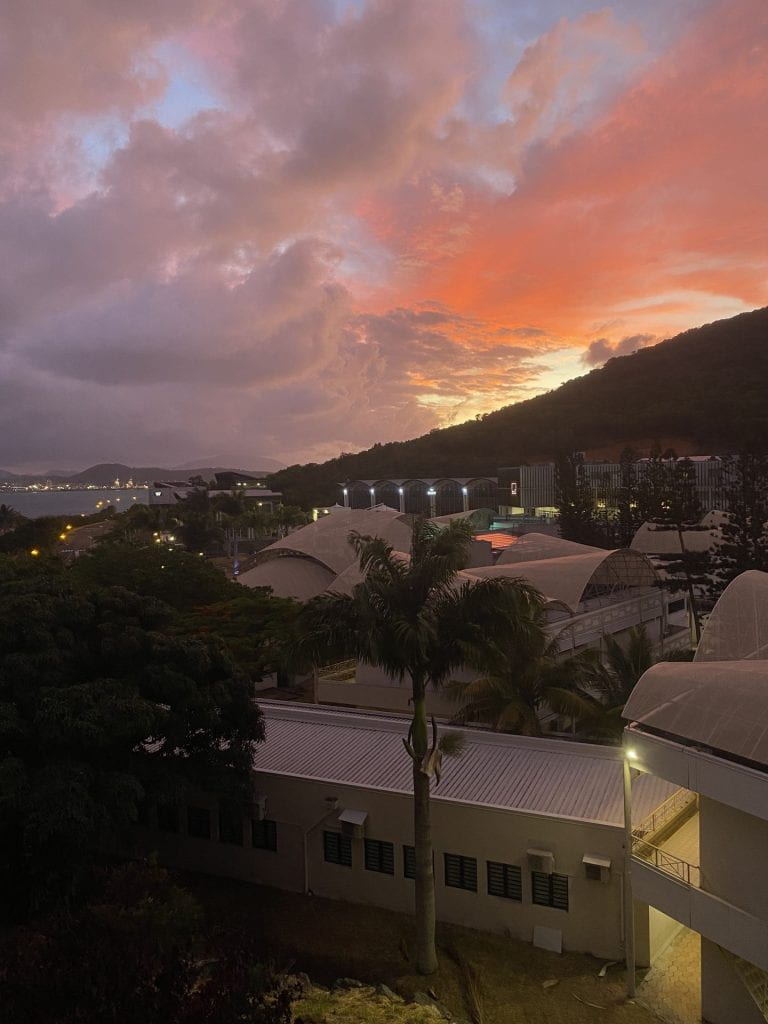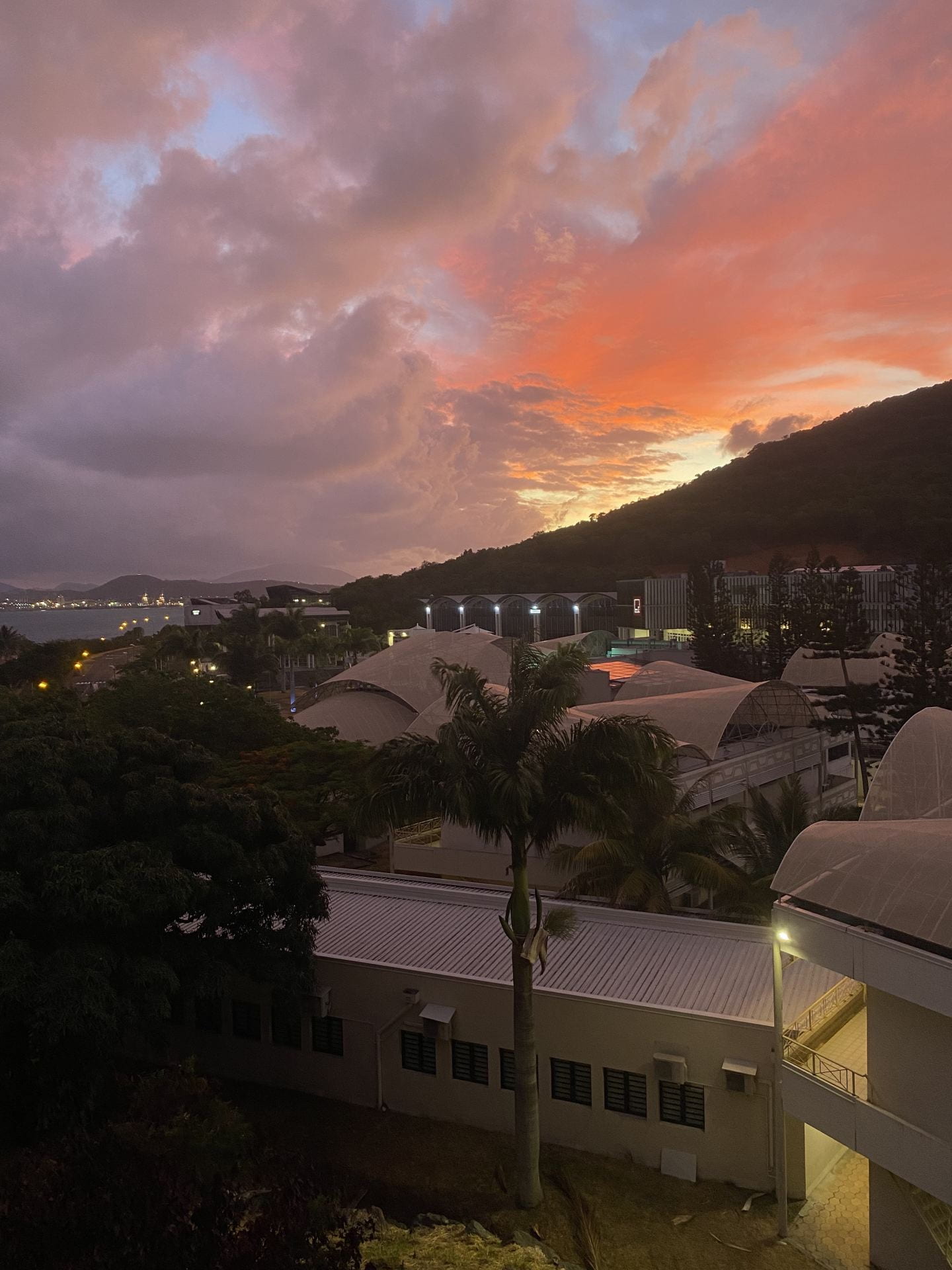


I found out about The University of New Caledonia French Summer School exchange program while taking French 304 at UoA. Specifically, the program had been recommended by our lecturers as one of a few French exchange opportunities available to UoA students. This year, with only one French paper left to complete for my Global Studies degree, I knew I wanted to end my French studies on a high note. Because studying abroad has also been a long-time goal of mine, applying to study in New Caledonia for three weeks seemed like the perfect option.
Being part of the UNC summer school program is quite intensive, being full of back-to-back activities, French classes, and seminars on Caledonian culture and society. Although very full-on, I enjoyed being able to start days with language classes and end with a thematic seminar on a topical subject. With this program only lasting three weeks, these daily seminars made a world of difference as it allowed me to build a broad understanding of Caledonian culture despite having only a short timeframe to experience it.
As far as group activities go, one of the highlights of my summer school experience was our group’s trip to Ouaté, located a couple hours North of Nouméa. During this excursion, we were fortunate enough to spend a weekend in rural New Caledonia learning about Kanak culture from locals. Some activities included a walk along the local river, weaving, hiking up to taro fields and meeting taro farmers to learn about their daily work. Additionally, being able to have breakfast, lunch and dinner with each other throughout the weekend and sleeping in a dormitory were things I really think brought our entire summer school group closer together and made the weekend feel like more of a bonding trip than an aspect of traditional summer school.
Apart from visiting Northern New Caledonia, as a city, Nouméa has a lot to offer in terms of outdoor excursions. Personally, I enjoyed visiting beaches, such as Kuendu Beach – a 30-minute walk from campus – and Baie des Citrons, which was just a bus ride away. In saying this, one downside of Nouméa is that it is not very walkable. The UNC campus is located on the outskirts of the town, which usually meant that walking to places like Kuendu Beach or our nearest supermarket meant you would be walking along the roadside or on dirt pathways, which is a contrast to what you may be used to living in and around UoA’s city campus. Because Nouméa is not very walkable, taking the bus is typically more convenient, although it was unfortunately quite pricey for a one-way bus ride (~$4-5NZD).
One of the main aspects of studying overseas at a University is, of course, the student accommodation. I had never stayed in a hall of residence before, so moving into the International Student Residence at UNC was a novel experience for me. In my case, I was fortunate to be located on the second floor which provided an incredibly picturesque view of the landscape and ocean! Each room in the accommodation included a desk, mini fridge and two closets, which I found to be more than enough storage for three weeks’ worth of clothing and belongings. As for the bathroom, each student had a private shower, mirror and sink and shared a toilet with our next-door neighbour. I found the corridor layout of this area quite nice, as I had the chance to chat with my dorm neighbour sometimes while getting ready for classes in the morning.
The final aspect of our living quarters was the communal kitchen, which I admit had its share of highs and lows. About halfway through our stay, a fellow student had the smart idea of implementing a cleaning timetable where two people were assigned to partake in nightly dish duty. I found this to be a really practical idea as sharing a kitchen with 30-odd people can get understandably messy!
What were the highlights of your experience during your time in the French Summer School?
Aside from participating in French lessons 5-days a week, one aspect of UNC’s French Summer School that I really enjoyed was the seminars we got to attend multiple times a week. These conferences were always focused on highly relevant topics, like New Caledonian law, biodiversity across the Pacific Islands, and Kanak culture (New Caledonia’s indigenous culture). These types of seminars were interesting in so many ways because not only were they helpful to develop our French listening comprehension, they also provided a nice contrast to the more technical French classes we would participate in from 8am-12pm each weekday morning.
Although improving one’s French is most likely what draws people to this program, having a proper portion of this experience dedicated to learning about the area and country in which we were staying is something that without a doubt enhanced my stay in New Caledonia. With only three weeks to spend in Nouméa, getting to hear from lecturers who were equipped with detailed knowledge about topics related to Pacific and Caledonian culture was one of several aspects that set this course apart from other French classes I had previously completed at UoA.
Were there any activities that were unique to your host country or university that you would recommend?
One thing I could not stop doing while in New Caledonia was eating pastries! Not only are they so cheap, but you can find them almost anywhere! A few patisseries that I discovered during my stay that I would highly recommend are: ‘Les Petits Choux’ and ‘Aux Délices de Nouméa’. Aside from these, most of the time, I found that I would end up stumbling upon places like grocery stores or convenient stores that had dedicated sections for baguettes and sweet pastries. The best part was, they were always freshly baked!
Second, if you enjoy reading or want to improve your French reading skills, you are in luck! I had the chance to firstly discover ‘Librairie Calédo Livres’. This little hole-in-the-wall French bookstore has books by Caledonian authors and a handy bargain bookshelf if you want to read on a budget. Alternatively, ‘L’As de Trèfle’ has every book you could want, but of course, translated into French. Living in New Zealand, I find that one of the most challenging things to do as a French student is to find French novels. So, I would definitely recommend taking advantage of bookstores like these while you are in Nouméa on exchange.
What are your top 3 tips for future students attending this programme?
Tip 1: Remember to bring a converter charger! Although it might seem obvious, before embarking on this exchange, I mistakenly assumed that since New Caledonia was so close to New Zealand, they would have the same outlets… but no! When going to charge my laptop and phone the first night, I found that the outlets in Nouméa were European and not New Zealand compatible. Luckily, if you do end up in a similar dilemma, the student helpers at the accommodation assisted me and another UoA student in locating converters to buy locally. Alternatively, if you are a bit of a last-minute person, finding an NZ/Euro converter is always an option once you get to Auckland International Airport.
Tip 2: Three weeks goes by quickly! If you are contemplating doing a particular activity, outing or getting to know someone while you are at UNC, do it! During the first week, I was very focused on finding my footing around a brand new group of people, which is, of course, expected, while the second week flew by as we prepared for our final assignments due in week three. In the end, I found that weeks of studying and settling in unexpectedly made the final week of classes sneak up on me and left me wishing I had more time!
Tip 3: Get a good night’s sleep. Being an intensive summer school program, days at UNC can get quite long. On a day-to-day basis, classes would normally run from 8am to 12pm, followed by a 1 or 2-hour break, then group activities which would sometimes last until 6pm. With so many interesting things happening, activities are definitely something you want to take advantage of. Yet, due to the full-on schedule, the nights where I made myself clock in a little early are what I found helped me keep organised, energised and able to make the most of my time on exchange.
How much did you budget? Was this enough? Were there any lessons learned that would help future students budget for their own short-term programme?
Once I knew I wanted to apply for the UNC Summer School program, I chose to set up an automatic transfer of 20 dollars a week that went into a personal ‘Travel’ savings account. Once my exchange departure grew closer (about a month away), I then began transferring a bit more each week in preparation. Altogether, while overseas, I spent ~$600NZD, which included buying food, bus fare, spending on leisure activities and purchasing souvenirs for family. As a general starting point, I would recommend setting aside what you usually spend on transport and food in Auckland over three weeks and doubling it to be safe. Once you have reached that goal, any extra money you save can be kept for personal shopping or activities you may want to do while in Nouméa.
To help get a more detailed idea of how much to budget, I think it is helpful to know that in New Caledonia, food is generally equally or more expensive than in New Zealand, especially if you want to buy products like chocolate, crisps, produce, shampoo, and some hygiene products. If you are trying to keep to a budget, I would suggest chatting to other people in the residence about splitting the cost of things like laundry detergent or organising weekly group grocery outings where you could potentially split the cost of basic food essentials (like rice, pasta, and frozen veggies) to cut costs.
Extra budgeting tips and insights for future UNC exchange students:
1. There is an ATM next to campus, which charges a flat rate fee per withdrawal. It is worth considering on in New Caledonia whether getting cash out during your exchange or using a bank card regularly is cheaper, depending on which charges the lowest fees.
2. Get used to the currency equivalency early on! I went over budget on my first visit to the supermarket because I had not properly familiarised myself with this! Knowing that 1000CFP is ~$15NZD is something that really helped me save more money and spend wisely when on the go.
What were the most significant takeaways from your experience with this programme?
Studying abroad at UNC definitely reaffirmed to me that pursuing fully immersive language experiences is the key to improving your speaking, reading and writing abilities. At first, the idea of going to New Caledonia – where everything is in French – was highly intimidating. Yet, being able to exercise my French skills inside and outside the classroom made all the difference and definitely helped me feel more comfortable and confident in my speaking capabilities.
Anything else you’d like to highlight?
I highly recommend this experience to people contemplating or preparing to go on a long-term exchange. As someone who had never experienced staying in halls of residence or living in a different country than my immediate family, studying in New Caledonia for three weeks really helped me become more comfortable with the idea of doing a semester exchange overseas in the future. Specifically, this program is perfect if you want to get a realistic sense of what living abroad is like in a university setting and understanding what types of personal hurdles or experiences you might have to overcome while living in a brand-new environment.
Secondly, upon arrival, you will find that everyone is extremely welcoming, and that you will make friends (even if you don’t go into the program with that being your primary aim or expectation). The team at UNC really knows how to cultivate a tight-knit community amongst exchange students. Living in the International Student Residence, attending classes 5 days a week with everyone, and participating in group activities outside of class provided the perfect atmosphere for meeting new people who were equally as passionate about improving their French as I was!
My last takeaway from this experience is that going on an exchange, even a short-term one, is a commitment! At UNC, everything runs on a tight schedule and understandably so. Although you can certainly carve out moments to hang out with other students or retreat to your room to recharge, you should be aware that the pace of this summer school program is very different from a normal summer school class or semester course at UoA. Still, being able study in a sunny campus in New Caledonia, while meeting other students and dedicated UNC teachers more than made up for the course’s intensity.
